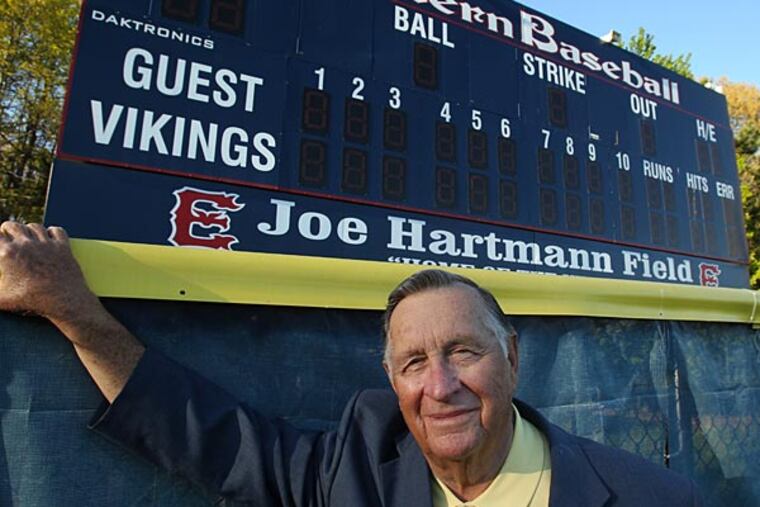Diamond Classic turns 40
In the spring of 1974, Camden Catholic baseball coach Joe Galliera was sitting in the athletic office at Eastern High School with Vikings coach Joe Hartmann and Gloucester Catholic coach Jim Carr.

In the spring of 1974, Camden Catholic baseball coach Joe Galliera was sitting in the athletic office at Eastern High School with Vikings coach Joe Hartmann and Gloucester Catholic coach Jim Carr.
Hartmann had an idea.
He wanted to create a tournament.
"I'll never forget when Joe first presented this," Galliera said. "He looked at me and Jim and said, 'What do you think?' "
Galliera, now the athletic director at Kingsway, said he feels the same way about Hartmann's proposal today as he did 39 years ago: It's a bonanza for South Jersey baseball.
"It's been a great event since Day 1, and it's still a great event," Galliera said. "How many things can you say that about after 40 years?"
The tournament that Hartmann, Galliera, Carr, and some other members of the fledgling South Jersey Baseball Coaches Association hatched in 1974 marks its 40th year this spring.
Now known as the Joe Hartmann Diamond Classic, the 16-team, single-elimination tournament is perhaps the most prestigious event in South Jersey sports, outside of state playoff competition.
It's known for its fast-paced play (thanks to popular speed-up rules); high-caliber competition; and broad appeal, with two teams from every conference in South Jersey guaranteed berths in the single-elimination tournament.
The field for the 40th annual Joe Hartmann Diamond Classic will be announced Sunday. The tournament begins with first-round games at four sites on May 11, with the championship game set for the evening of May 19 at Eastern High School.
"The thing that stands out for me is the cooperation we've received," said Hartmann, now 81 and retired from education but still the director of the tournament that has borne his name for the last 15 years. "The coaches, the athletic directors, the administrations - everybody worked together."
No adjustments
Like its founding father, the tournament is a link to the sport's past. Like nearly every aging institution, it can at times seem a touch old-fashioned.
Hartmann this year has heard some complaints from coaches about the tournament's lack of a seeding system. The Diamond Classic sets pairings before the start of play, plugging teams into preestablished brackets.
This season, for example, the Olympic American champion is set to play the No. 1 At Large representative in the first round. That could mean a game between top-ranked Gloucester Catholic and No. 5 Washington Township, a matchup that some baseball observers believe would make for better competition later in the tournament, perhaps even in the title game.
"We're not going to make any adjustments," Hartmann said of complaints about a possible matchup of top-five teams in the rankings in the first round.
Bishop Eustace coach Sam Tropiano, whose team has won the tournament five times, including in 2012, said Hartmann's insistence on a representative field that includes smaller schools creates a "March Madness" kind of feel to the Diamond Classic.
"That's so important to Joe," Tropiano said.
Galliera's Camden Catholic team won the first tournament in 1974. Galliera said the Irish rode the right arm of 5-foot-7 pitcher Jim Vendetti, who threw three shutouts, including a 6-0 victory over Penns Grove in the first title game.
"It was eight teams back then," Galliera said. "We beat Cinnaminson, 10-0, in the first game. Then we beat Audubon, which had [Iowa recruit] Rich Carlucci by 1-0. Then we beat Penns Grove, and we never gave up a run."
In the early days, the tournament conflicted with the state tournament. The first title game was played on June 15, 1974.
So for a few years, teams sometimes would be forced to withdraw or not enter the tournament if there was a conflict with state tournament play.
But in recent years, the tournament has been moved up to the middle of May, creating an opportunity for teams to play in the event before the start of the state tournament.
"To us, it's right there with winning a state tournament," Tropiano said. "We think it's that prestigious of an event."
Hartmann said the tournament helped usher in the modern era in South Jersey baseball, creating much more interaction between programs in the seven-county area.
"Schedules used to be so parochial," Hartmann said. "You hardly played anybody outside your conference. But coaches got to know other coaches and started scheduling games."
Hartmann also said the tournament has been instrumental in helping many athletes attract the attention of college recruiters.
"The big thing for us has been the exposure for the kids," Hartmann said.
The tournament also is known for its "speed-up" rules, which were first formalized at the annual Bridgeton semiprofessional tournament in the late 1960s.
Under Diamond Classic rules, a pitcher must start his windup within 20 seconds of receiving the ball, batters must stay in the box, and only one throw is allowed after an out. Pitchers also are allowed just five warm-up throws between innings.
"We've gotten so many compliments on that," Hartmann said.
"Huge deal"
Despite some squawking over the lack of a seeding process and a selection system that almost guarantees that the 16 "best" teams aren't in the field, the Diamond Classic remains a centerpiece of the South Jersey baseball season.
"It's definitely still a huge deal," Eastern senior second baseman Nick Tierno said of the tournament. "It's one of our main goals we set before the season. To play in it is such an honor and a chance to showcase your team and play against the best teams in all the groups in South Jersey."
Tropiano said the Diamond Classic still is special because of the man who presented it to a couple of his peers in that office at Eastern back in the spring of 1974.
"That tournament is Joe," Tropiano said. "He represents all that we love about this game."